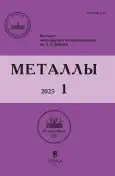Phase composition, texture and residual stresses in steels with 1.6 and 2.9% mn after hardening and cold rolling
- Autores: Lukin E.I1, Ashmarin A.A1, Betsofen S.Y.2, Sevalnev G.S3, Aleksandrov A.A1, Chernenok D.V1
-
Afiliações:
- A.A. Baikov Institute of Metallurgy and Materials Science of the Russian Academy of Sciences
- Moscow Aviation Institute (national research university)
- National Research Center «Kurchatov Institute» — VIAM
- Edição: Nº 1 (2025)
- Páginas: 51-58
- Seção: Articles
- URL: https://bakhtiniada.ru/0869-5733/article/view/315220
- DOI: https://doi.org/10.31857/S0869573325015158
- ID: 315220
Citar
Resumo
Palavras-chave
Sobre autores
E. Lukin
A.A. Baikov Institute of Metallurgy and Materials Science of the Russian Academy of Sciences
A. Ashmarin
A.A. Baikov Institute of Metallurgy and Materials Science of the Russian Academy of Sciences
S. Betsofen
Moscow Aviation Institute (national research university)
Email: s.betsofen@gmail.com
G. Sevalnev
National Research Center «Kurchatov Institute» — VIAM
A. Aleksandrov
A.A. Baikov Institute of Metallurgy and Materials Science of the Russian Academy of Sciences
D. Chernenok
A.A. Baikov Institute of Metallurgy and Materials Science of the Russian Academy of Sciences
Bibliografia
- Z.G. Hu. Fatigue properties of transformation-induced plasticity and dual-phase steels or auto-body lightweight: Experiment, modeling and application / Z.G. Hu, P. Zhu, J. Meng // Mater. Design. 2010. V.31. P.2884–2890.
- P.G. Xu. Evaluation of austenite volume fraction in TRIP steel sheets using neutron diffraction / P.G. Xu, Y. Tomota, Y. Arakaki, S. Harjo, H. Sueyoshi // Mater. Charact. 2017. V.127. P.104–110.
- Ye Tian. Micromechanics and microstructure evolution during in situ uniaxial tensile loading of TRIP-assisted duplex stainless steels / Ye Tian, Sen Lin, J.Y. Peter Ko, Ulrich Lienert, Annika Borgenstam, Peter Hedström // Mater. Sci. Eng.: A. 2018. V.734. P.281–290.
- Farnoush, H. Hot deformation characteristics of 2205 duplex stainless steel based on the behavior of constituent phases / H. Farnoush, A. Momeni, K. Dehghani, J.A. Mohandesi, H. Keshmiri // Mater. Design. 2010. V.31. P.220–226.
- Caballero, F.G. Theoretical design and advanced microstructure in super high strength steels / F.G. Caballero, M.J. Santofimia, C. García-Mateo, J. Chao, C.G. de Andrés // Mater. Design. 2009. V.30. P.2077–2083.
- H. Luo. Effect of intercritical annealing on the Lüders strains of medium Mn transformation-induced plasticity steels / H. Luo, H. Dong, M. Huang // Mater. Design. 2015. V.83. P.42–48.
- Y. Zhao. Stress distribution correlated with damage in duplex stainless steel studied by synchrotron diffraction during plastic necking / Y. Zhao, L. le Joncour, A. Baczmański, E. Gadalińska, S. Wroński, B. Panicaud, M. François, C. Braham, T. Buslaps // Mater. Design. 2017. V.113. P.157–168.
- Pérez., E.D. Martensite reversion and texture formation in 17Mn-0.06C TRIP/TWIP steel after hot cold rolling and annealing / E.D. Pérez, S.S.F. de Dafé, S.D. Brandão // J. Mater. Res. Techn. 2015. V.4(2). P.162–170.
- Hedstroëm, P. Load partitioning and strain-induced martensite formation during tensile loading of a metastable austenitic stainless steel / P. Hedstroëm, L.E. Lindgren, J. Almer, U. Lienert, J. Bernier, R.M. Terner, M. Oden // Metal. Mater. Trans.: A. 2009. V.40. P.1039–1048.
- Ашмарин, А.А. Остаточные напряжения в поверхностных слоях с градиентной структурой / А.А. Ашмарин, С.Я. Бецофен, А.А. Лозован, М.А. Лебедев // Деформация и разрушение материалов. 2022. №2. С.18–26. – (Ashmarin A.A., Betsofen S.Y., Lozovan A.A., Lebedev M.A. «Residual stresses in surface layers with a gradient structure» // Russian Metallurgy (Metally). 2022. Is.10. P.1162–1168.)
- Банных, И.О. Исследование влияния степени деформации при испытаниях на растяжение на текстуру, фазовый состав и остаточные напряжения в α- и γ-фазах стали ВНС9-Ш / И.О. Банных, А.А. Ашмарин, С.Я. Бецофен, Е.И. Лукин, Г.С. Севальнев, Е.В. Блинов, А.А. Александров // Металлы. 2023. №4. С.50–59. – (I.O. Bannykh, A.A. Ashmarin, S.Ya. Betsofen [et al.]. «Effect of Tensile Deformation on the Texture, Phase Composition, and Residual Stresses of the α and γ Phases in VNS9-Sh Steel» // Russian Metallurgy (Metally). 2023. Is.7. P.905–913. doi: 10.1134/s0036029523070029.)
- Бецофен, С.Я. Влияние холодной прокатки на фазовый состав, текстуру и остаточные напряжения в сталях с 15,9 и 17,7% Mn / С.Я. Бецофен, Е.И. Лукин, А.А. Ашмарин, И.О. Банных, В.М. Блинов, Г.С. Севальнев, А.А. Александров, Д.В. Черненок // Деформация и разрушение материалов. 2024. №10. С.26–34. – (S.Ya. Betsofen, Ye.I. Lukin, A.A. Ashmarin, I.O. Bannykh, V.M. Blinov, G.S. Seval’nev, A.A. Aleksandrov, D.V. Chernenok. «Vliyaniye kholodnoy prokatki na fazovyy sostav, teksturu i ostatochnyye napryazheniya v stalyakh s 15,9 i 17,7% Mn» // Deformatsiya i razrusheniye materialov. 2024. №10. S.26–34.)
Arquivos suplementares









